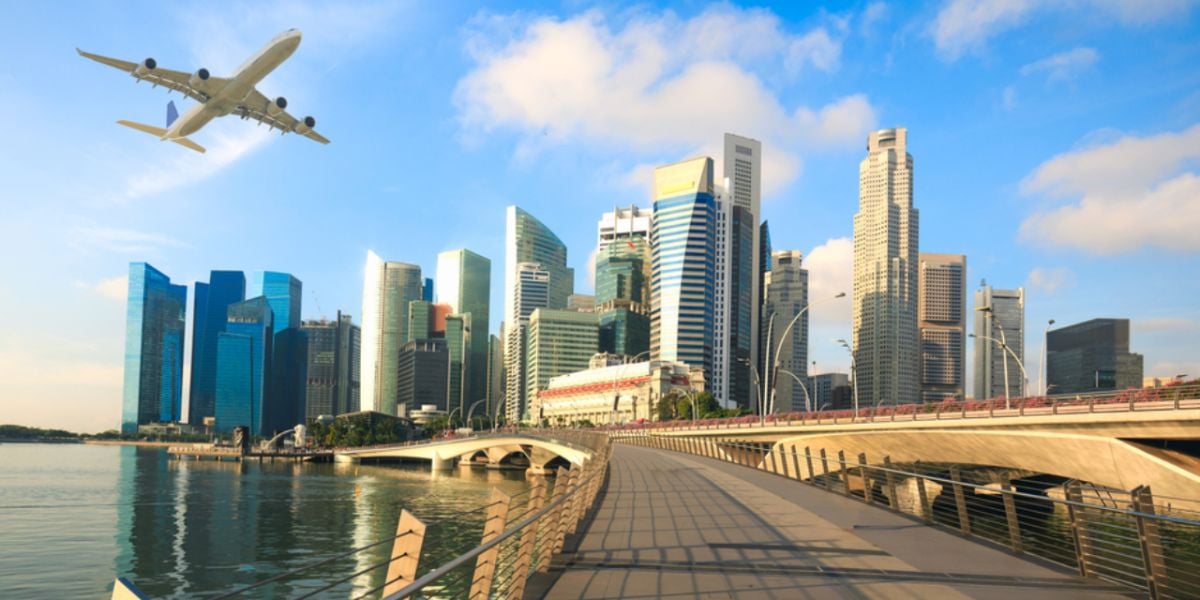
Tourism is an important pillar of Singapore's economy, and the country often portrays itself as an Asian stopover destination. Therefore, Singapore has put in place a relatively flexible visa policy that allows nationals from many countries to travel visa-free.

Singapore's entry requirements
In order to visit Singapore, travelers will need to be in possession of a valid travel document with at least 6 months' validity at the time of departure. The Ministry of Foreign Affairs maintains a list of nationalities for which a visa is required, classifying them into two groups (Assessment 1 and Assessment 2 countries), with some nationalities having the possibility to apply for an electronic visa.
The countries are as follows: Afghanistan, Algeria, Armenia, Azerbaijan, Bangladesh, Belarus, Democratic People's Republic of Korea, Egypt, Georgia, India, Iran, Iraq, Jordan, Kazakhstan, Kosovo, Kyrgyzstan, Lebanon, Libya, Mali, Moldova, Morocco, Nigeria, Pakistan, the People's Republic of China (PRC), Russia, Saudi Arabia, Somalia, South Sudan, Sudan, Syria, Tajikistan, Tunisia, Turkmenistan, Ukraine, Uzbekistan, and Yemen.
You'll also need to apply for an entry visa if you've got a refugee travel document, alien's passport, Palestinian Authority passport, temporary passport given by the United Arab Emirates, travel permit from the Macao Special Administrative Region, or a Document of Identity given by the Hong Kong Special Administrative Region.
Visa-free transit in Singapore
Some of the citizens of the above countries may be able to pass through Singapore without having to get a visa. The countries are as follows: Commonwealth of Independent States (CIS), Georgia, India, the People's Republic of China (PRC), Turkmenistan, and Ukraine. This means you may pass through Singapore with a 96-hour visa-free transit by using the visa-free transit facilities (VFTF).
To be eligible for the VFTF, if you're from India or the PRC, you must leave Singapore by air or sea (you can enter any way you wish). You'll need to show proof of a ticket departing the country within the next 96 hours. In addition, you'll need a valid visa issued by the following countries: Australia, Canada, Germany, Japan, New Zealand, Switzerland, the United Kingdom, and the United States. For Germany and Switzerland, a Schengen visa applies here.
For citizens of the Commonwealth of Independent States (CIS), Georgia, Turkmenistan, and Ukraine, the requirements are a lot laxer. All you need is a valid airline ticket that leaves in the next 96 hours. You can initially enter Singapore through any type of transportation.
As to be expected, because this exemption is meant for layovers, you won't be able to apply for an extension of stay. This is strictly enforced.
Coming from countries with visa requirements
For travelers who aren't from visa-exempt countries, an entry or business visa can be obtained from the embassy or consulate in your country of residence. The visa application process is generally streamlined, and all documentation can be obtained online. For most nationalities, however, a visa isn't required, and most travelers are allowed to stay in Singapore for periods of 30 days or 90 days.
Visitors in Singapore need to comply with some basic requirements, including holding an onward or return ticket. While these tickets aren't systematically checked, it's highly recommended to print the details of your tickets for presentation to immigration officials. Travelers should also present proof of sufficient funds to maintain themselves while in Singapore. It's also advisable to have details of your accommodation in Singapore handy (including addresses and telephone numbers).
Travel vaccines for Singapore
There are no specific vaccination needs while visiting Singapore, except for travelers who have visited a country that has a high risk of yellow fever. The website of the Immigration and Checkpoints Authority (ICA) provides the list of nationalities for which an International Certificate of Vaccination is required. Many clinics offer yellow fever vaccines, both in private and public hospitals.
Long-term stay in Singapore
Some visitors to Singapore might find themselves in a situation where they have to extend the duration of their stays. Singapore makes this very easy by allowing travelers to carry out the extension through an online portal called e-XTEND.
Every year, many foreigners visit Singapore for medical treatment, and it might be particularly relevant for these visitors to seek to extend the duration of their stay in the country. This is a generally straightforward process (although some nationalities might require a sponsor), as outlined by the ICA.
Some visitors might be required to stay for longer periods of time if, for example, their spouses are Singaporean, they wish to deliver a child in Singapore, or they're students wishing to find employment in Singapore. For these categories, a Long-Term Visit Pass might be relevant. There are specific guidelines and eligibility requirements for each category, and an e-service system is available for potential applicants, which is again accessible from the ICA's website.
Once your paperwork is ready, Singapore will only ever be a couple of flights away. With an ultra-modern airport regarded as being one of the best in the world and a very extensive range of airlines serving the country, interesting deals are never far away. In some cases, and depending on where you're traveling from, you might even be able to purchase cheap tickets from one of the many low-cost carriers serving Singapore, including TigerAir and Scoot.
Travel insurance in Singapore
No matter where you're traveling in the world, it's always a good idea to get travel insurance. You never know if you'll get ill or into an accident, and the bills can be astronomical if you aren't covered properly.
There are plenty of companies to choose from, so take the time to browse your choices. To be on the safe side, make sure the policy you select has a minimum coverage of S$30,000.
How to get to Singapore
There are several ways you can get to Singapore, some of which may be more convenient than others, depending on where you're coming from. Below are your options.
By plane
Most people will choose to fly to Singapore, especially if they're coming from out of Asia.
You'll want to fly into Singapore Changi Airport (code SIN), as that's the major airport that serves the nation. It's about 13 miles northeast of Singapore itself. In addition, the national airline is Singapore Airlines, so you'll most likely get the best deals and availability booking with this company. If you're coming from somewhere close by and want to save money, your two choices for low-cost airlines are Jetstar Asia Airways and Tiger Airways.
By train
You can also travel to Singapore by train if you're coming from Malaysia or Bangkok, Thailand. There are two railroad lines between Singapore and Malaysia. On one, you can depart from Kuala Lumpur or Johor Bahru. If you're coming from Bangkok, you can change the transfer to Kuala Lumpur to get to Singapore.
Otherwise, the other line starts at the northeast coast of Malaysia. This line stops off in Tanah Merah and Wakaf Bharu, and you can catch this train three times a day.
By bus
There are regular buses that run from 5:00 am to midnight, so it'll be easy to find one to take you to Singapore. The two companies to choose from are SBS and Causeway Link, although we'd suggest going with the latter if you're in a hurry, as they're much quicker. Also, if you're coming from Johor Bahru, it's better to take the bus rather than the train. It'll take you straight to the city center rather than north of it in Woodlands, which is where the train station is.
When you cross into Singapore, expect to get off the bus; this is due to border policies. You must take off all your belongings when you do so. Don't throw away your original bus ticket, as you'll need it to get on another bus from the same company. This bus will then take you to Singapore.
By boat
Traveling by boat to Singapore is a great option because it's a major port. Therefore, you can count on numerous ferries stopping off here from Malaysia. Major ferry companies that serve Singapore include Batam Fast, Bintan Resort Ferries, Indo Falcon, Sindo Ferry, and Limbongan Maju (from Tanjung Belungkor).
There are also ferries that take you to Desaru in Malaysia. However, service can be erratic, so you'll want to double-check the schedule before you make plans.
By car
If you'd rather transport yourself to Singapore, then driving is doable. There are two causeways you can take from Malaysia to Singapore. However, the one you'll probably want to take is the Johor-Singapore Causeway, which takes you to downtown Johor Bahru. It's much more convenient and, therefore, more popular.
How to find good deals for travel to Singapore
Traveling to Singapore can be expensive, so you'll want to save wherever you can.
Whether you go by plane, boat, train, or bus, you should use comparison sites. These are more often available for flights since bigger sites cater to this travel need, such as Google and Skyscanner. Note that travel will be more expensive during holidays, including the Chinese New Year. Tickets will also be most expensive in the summer months, as people travel for leisure the most during this season.
Airbnb and any other kind of home-sharing services are not legally available in Singapore, but there are lots of options for hotel rooms.
We do our best to provide accurate and up to date information. However, if you have noticed any inaccuracies in this article, please let us know in the comments section below.








